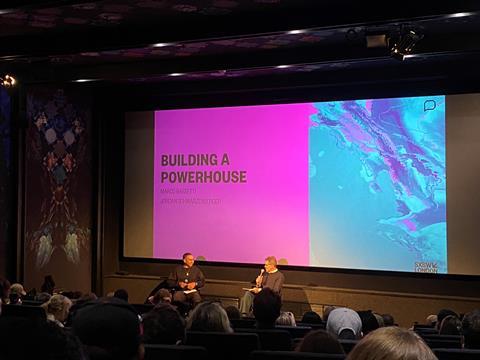SXSW London sees debate about legacy TV and creator economy production, and which side is more threatened or aided by AI
The inaugural SXSW London this week has very much been a paean to the new, the cutting edge and imagined futures across media, art, culture and tech.
However, from a TV and film perspective, it was a case of worlds colliding during the keynote ‘Building a Powerhouse’ session – a conversation between Banijay Entertainment chief exec Marco Bassetti and Jordan Schwarzenberger, co-founder of Arcade Media, the management company that represents YouTube and social media giants Sidemen.

Amid much jocularity about their various stages of experience – Schwarzenberger made the point that when Bassetti’s career was in its infancy he was over a decade from being born – there was a serious discussion about legacy TV production’s place in the era of the creator economy, as YouTube and other social video platforms become the battleground, rather than the training arena, for the next generation of creatives.
Schwarzenberger posited that YouTube “changes the whole dynamic of ownership” with creators like Sidemen now able to command more leverage in the pitch room with broadcasters and buyers because they have a proven audience driver, delivered through Sidemen’s own production capabilities and editorial choices.
“The conversation isn’t around ‘please can we get this format commissioned by you’, it’s around how can you [a Netflix or Amazon] blow this up into a bigger global format together. Once you have audience you have the power, that’s my take.”
Major streamers are already talking directly to content creators who have proven concepts on platforms such as YouTube, and with the likes of Sidemen and other creators “moving more into that executive producer role” rather than necessarily being simply on-screen talent, Schwarzenberger posed the question: do creators need the likes of Banijay?
“It’s true that creators say they don’t need Banijay,” Bassetti acknowledged. “But if I can be a bit provocative, I can’t see, yet, premium content coming from the creator [economy]. The very premium content - it will happen, for sure, but monetising content is becoming difficult.
“With YouTube, you are linked to a worldwide, global platform that decides what the terms of trade are”
Marco Bassetti, Banijay Entertainment
“I can’t see big premium scripted programming, big reality shows, because I don’t see how you can create value if you’re using certain kinds of talent [which we have access to].”
He said the “ecosystem” of traditional production can “create a lot of value in other spaces”, while the “start of everything for a creator is YouTube”.
“You are linked to a worldwide, global platform that decides what the terms of trade are,” Bassetti continued. “The revenue share model of 50/50 could change. Tomorrow it could be 75% for me, 25% for you. In the other ecosystem, with strong IP, you can pitch to Amazon, Netflix. You can create value and you’re much more protected.”
AI and lo-fi authenticity
However, Schwarzenberger suggested the “concept of premium” is altering for new audiences, who he believes are more interested in lo-fi production values that are “more authentic” in a world where AI is beginning to pervade the content landscape.
With Netflix communicating to Sidemen, he added, that it wants the group’s vision of production for the upcoming series of entertainment format Inside, legacy production is being challenged further.
“In this new world, where everything’s AI, when everything’s finessed to the extreme, premium isn’t really that attractive, potentially, because you can’t even tell, maybe, that it’s authentically done by the creatives,” he said.

“I think younger audiences are moving more towards lo-fi, more towards DIY, authentic-looking content that doesn’t look like TV.”
Bassetti agreed that AI is the “elephant in the room”, and the industry’s response to its pervasiveness is to have “very strict rules to protect the creative” and be as “transparent” as possible with its usage. He said this means it would only have a “relative impact” on premium shows, effectively rebutting the assertion that it is encouraging younger audiences to seek the lo-fi of YouTube’s creator economy content.
“In YouTube, in the world of the creator,” Bassetti added, “maybe AI is [more readily usable] because a reduction of cost is key to monetise and reach the premium levels. In a creative world, it’s about how can we defend the creatives from being put out of the business by AI.”
Schwarzenberger insisted “personality and creators are the defence against AI”.
“That sort of imperfect, intangible draw [of YouTube creators] is attractive to watch, you can never generate or make that.
“Young audiences are so done with AI slop. They’re done with everything being finessed. Personally, that poses a massive threat to the premium content world that has existed in finesse and has [created] all the inputs that are feeding these generative systems that are now producing content en masse, when you can’t really tell the difference.
“Produced content is at risk. Creators are about to hit a new heyday.”
The battle lines are being drawn.









No comments yet